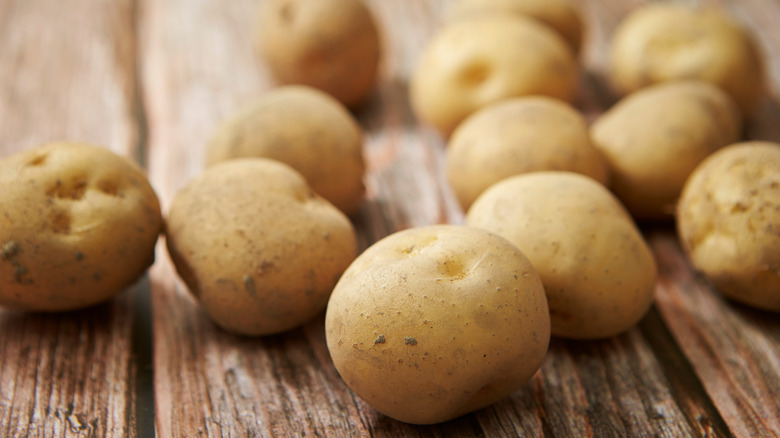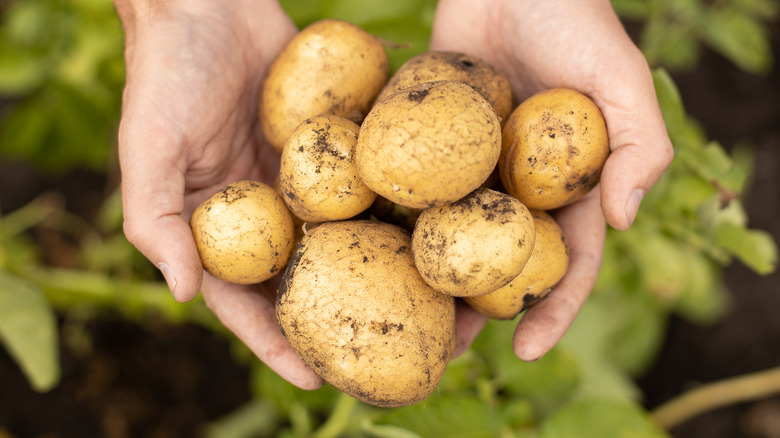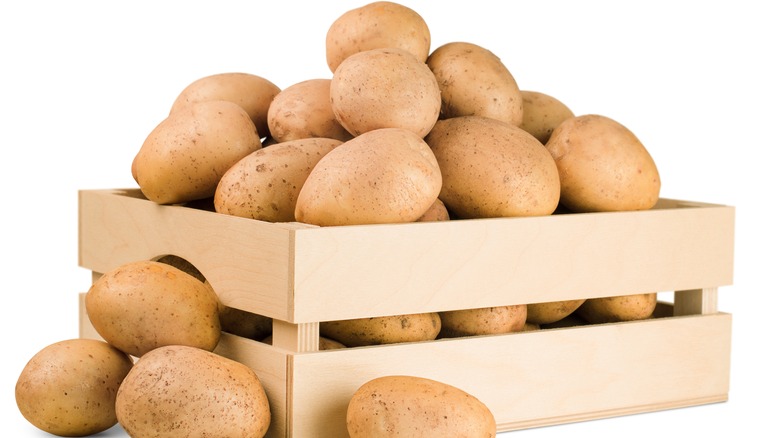Are Raw Potatoes Actually Safe To Eat?
Is it safe to eat a raw potato? Probably. Is it safe to eat a lot of raw potatoes? Probably not. Is it safe to eat some raw potatoes? Maybe! As with many edible things, uncooked potatoes can be fine to have in moderation.
But why would somebody eat a raw potato in the first place? Situational reasons like a lack of heat source aside, there are nutritional justifications for this. Raw veggies are often healthy by nature, and taters are not necessarily excluded.
The resistant starches in raw potatoes can give fuel to beneficial gut bacteria, enhance insulin sensitivity, lower blood sugar, and help those trying to lose weight. Uncooked spuds might additionally aid digestive health, counteracting bloating, IBS, and stomach pain, as well as reduce the chances of both cancer and inflammation in the colon. Furthermore, the raw tubers contain more vitamin C but less calories and carbs than baked ones. In fact, eating raw potatoes is a bit traditional for some families in the United States. Remember, however, that this is not a practice you want to go overboard with.
Uncooked spuds are not flawless
There are just as many (if not more) downsides to raw potatoes as there are upsides. First of all, to most folks, they simply don't taste as good as cooked ones, because they're bitter and starchy. They also contain a number of harmful components.
Toxic glycoalkaloid chemicals, for instance, are common in raw potatoes (as well as green or sprouted spuds), and they can lead to diarrhea and nausea in consumers, according to Poison Control. Additionally, glycoalkaloid toxicity might inflict drowsiness, itchiness, and sensitivity on the eater. As odd as this fact may seem, glycoalkaloids exist to deter animals from eating the potato plant in the wild.
Furthermore, too many of those resistant starches can cause gassy bloating and stomach aches (counteracting what's supposed to be one of the upsides of raw spuds). This is because these starches aren't actually absorbed by your body; they are instead fermented by gut bacteria. Plus, specifically because these potatoes are uncooked and often unwashed, raw taters are more likely to be infected with foodborne illnesses.
Similarly, raw potatoes' plentiful protein trypsin inhibitors and lectin proteins are both anti-nutritious. In that same vein, raw potatoes also have less potassium, protein, and vitamin B6 than baked versions. All in all, raw potatoes are simply less digestible than cooked ones. So, what are people to do?
Try to avoid consuming raw taters
Despite some recent TikTok posts telling viewers to drink raw potato juice daily (or even place spuds in your socks) to cure illnesses, it's really best to just err on the side of caution and avoid raw potatoes in large, frequent quantities. Like raw potatoes in general, fresh potato juice might have some medicinal benefits, but it comes with similar drawbacks, too — as noted by Poison Control. Cooking potatoes is the most straightforward method to improve raw spuds. This process reduces harmful aspects, kills bacteria, and improves the taste, texture, and certain nutritional elements.
If you're concerned about the heaviness of many cooked potato dishes, worry not. The Idaho Potato Commission recommends roasting potatoes in vegetable oil and spices or topping baked potatoes with creamy horseradish or fresh tomato salsa. Alternatively, you can just make hash browns, mashed potatoes, or latkes.
Whether cooked or uncooked, though, proper storage will usually prevent potatoes from turning toxically viridescent (green potato chips are still safe to eat). Keep your spuds in ventilated, dark, and cool (not cold) places to prevent spoilage. Get rid of any that have been injured, molded, sunlit, or exposed to ethylene-producing fruit likeapples, bananas, pears, and peaches.
The choice between cooked and uncooked potatoes is not a "you say potato, I say potato" situation. Differences matter here, and you should cook your spuds (most of the time)!


